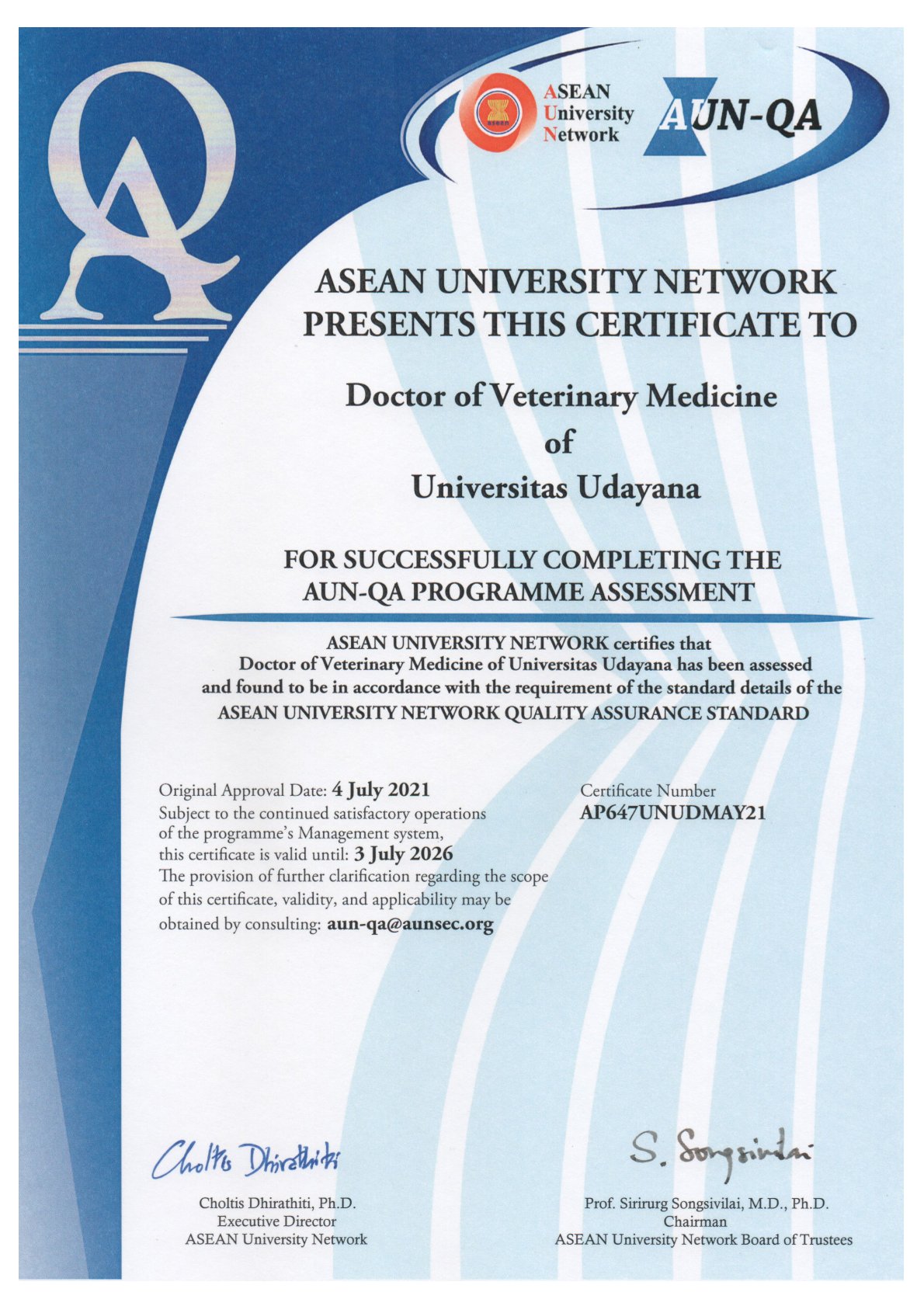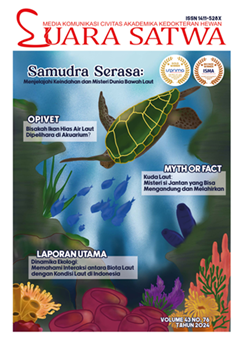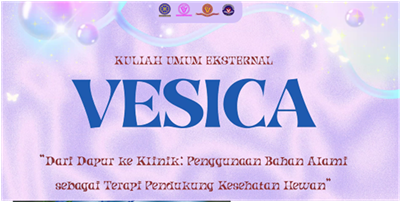Introduction Executive Summary
1.1 Executive Summary
The Study Program of Veterinary Medicine is one of study
programs under the Faculty of Veterinary Medicine-Udayana University (here and after called
SPVM-UN), which is located in Denpasar City, Bali. The SPVM-UN has held two
levels of education, namely undergraduate and professional programs in the
field of veterinary medicine since its establishment. The undergraduate program
is contained with a total of 146 credits (including a bachelor thesis),
followed by a professional program with 37 SKS (including a final assessment of
veterinarian). A student is awarded a title of Bachelor of Veterinary Medicine after
passing the undergraduate program, and then awarded a title of Doctor of Veterinary Medicine or Veterinarian
after finishing the professional program. For the specific competency of the faculty’s excellent program,
the SPVM-UN offers a range of scientific field of interests,
such as Bali cattle, Kintamani dogs, and Bali pigs, which are rarely found at other
veterinary educational programs in Indonesia. Recently (year 2019), the SPVM-UN has been re-accredited
and achieved excellent grade by the
Indonesian Higher Education Independent Accreditation Board of School of Medicine (LAM PTKes).
The SPVM-UN acts in
compliance with Udayana University policy on Quality Assurance. In order to pursue the excellent quality and
implement the rector of Udayana University instruction, the SPVM-UN intends to
adopt the ASEAN University Network-Quality Assurance (AUN-QA) framework
to be an ASEAN international standart institution in Southeast Asia. A task force team has been formed and they have worked intensively
to fulfill the AUN-QA criteria
such as the
expected learning outcomes (ELOs), programme specification, programme
structures and contents, teaching and learning approaches, student assessments,
academic staff quality, support staff quality,
student quality and support, facilities and infrastructures, quality
enhancement report, output of the faculty performance, and the analysis of
strengths and weaknesses of the program.
The ELOs of SPVM-UN have
been formulated in consideration to the Indonesian Veterinary Association and
the National Standards of Higher Education in Indonesia. The ELOs also consist of
stakeholder consideration and needs, and have been aligned with the vision
and mission of Udayana University.
The SPVM-UN curriculum is
structured based on the time unit of semester. The curriculum is designed
according to hierarchical system, i.e.: basic courses are given in the first of academic year, followed by intermediate
courses in the second to third
academic year, and finally specialized courses in the fourth academic year for the students. This system can foster the
students to achieve their
competencies. However, to keep updating with newest educational system, recent
stakeholders needs and the development of knowledge and technology, the
curriculum is revised every 5 years. On the other hand, reviewing the
curriculum, especially the content, teaching methods, and the schedule of the courses, is actually
held every semester to be fixed with the latest situation and students
expectation.
Moreover, the SPVM-UN is designed with a different
teaching and learning model for the undergraduate and professional programs. The
undergraduate program offers the form of teaching and learning in class,
seminar, community service (in field), and research. In
class, teaching
courses have been
formulated by combining tutorial and student centered learning. However, in
the professional program, teaching and
learning method have been mainly conducted in
laboratory, practiced in the field, and
an animal hospital or animal clinics. The profession students
are mainly learning in the form of
problem
based learning.
For student assessment,
the master of lecture
courses are evaluated in the
form of written
and oral tests, essay, task, performance, observational
assessment, or portfolio assessment which cover soft and hard skills. Schedules
of the final
test each semester, including the bachelor thesis assessment, and the final
test to be veterinarian are arranged, organized and fixed centrally in the
SPVM-UN. Meanwhile, the competency
exam of the veterinarian is held and organized nationally by the Indonesian
Association of the Faculty of Veterinary Medicine in collaboration with the SPVM-UN.
The SPVM-UN has been equipped
with qualified lecturers with their professional knowledge and skills. A total
of 71 lecturers, who are 15 professors (21,13%), 28 doctoral graduates (39,44%)
and 28 master graduates (39,44%) has supported and continually improved the quality of student’s teaching and
learning process. Moreover, the implementation of the research results based
theories are also fully implemented to improve the lecturer’s courses for the students.
In terms of academic staff qualification, member staff have highly academic
competency who always enthusiastic in facilitating the teaching and learning
process for the students. In addition, the implementation of online system called
IMISSU at Udayana University as the latest online educational management system has encouraged the academic and
administrative staff to work actively with high responsibility and discipline. By
using the recent educational technology with national standard facilities and
infrastructures sufficiently supports the success of the program.
In October 2019, SPVM-UN has graduated 2677 students with 1407 undergraduates, and 1176 veterinarians, who mostly achieved
honorable predicate of graduation. The alumni have worked at any level of occupations,
both in private and public sectors with occupational time around 3 months post graduate. Even,
some alumni have worked in international veterinary hospitals in Netherland, Iceland, Abu Dhabi, and
Malaysia.
On strengths and weaknesses
analysis, the SPVM-UN is rated at a higher level than adequate, which means the
supporting evidence has been more sufficiently implemented. The strengths
include expected learning outcomes that are clearly formulated, communicated,
and structured. Additionally, the study
program has been supported by qualified and certified lecturers who have highly
professional knowledge and skills. Furthermore, research results based theories
are also fully implemented by the lecturers to update the latest theories in
supporting the up-to-date related knowledge and improving the quality of the courses.
The staff members are always enthusiastic in facilitating the teaching and
learning process to the students. Moreover, the implementation of a new online management system namely IMISSU has encouraged the academic
staff as well as administrative and other supporting staff to work actively
with high responsibility and discipline.
Furthermore, sufficient facilities and infrastructures, contribution of the
alumni, and the curriculum reviewed on the feedback from stakeholders
periodically are also a strong
aspect to support success of the study program.
Nevertheless, improvement is also needed and implemented in order to overcome the weakness of the program. The improvement has been conducted and some are still ongoing such as: applying a set of integrated online tools with university to get more feedbacks from alumni and employers, improvement in English proficiency to any academic staff, support young lecturer staff by encouraging them to study abroad like America, Thailand and Australia. Support the students to have international veterinary education and experience by attending seminars, workshops or even short courses. Additionally, Veterinary English Club, an extracurricular activity for the students, is formed to support understanding and referring related scientific veterinary articles in English. In principal, the institution is committed to keep maintaining and improving the quality of graduates so that they can meet nationally and internationally market demand requirement.




UDAYANA UNIVERSITY